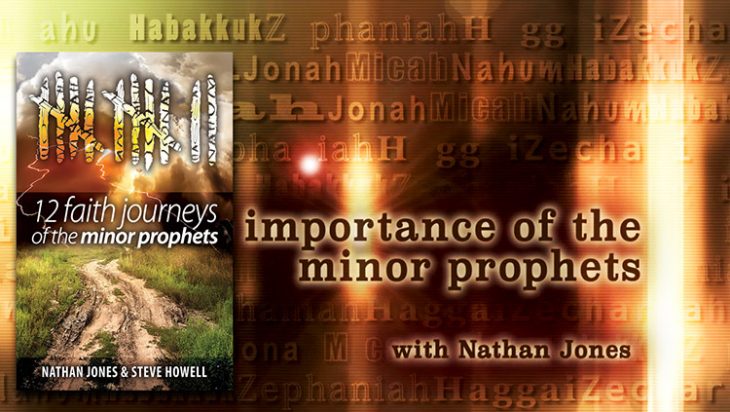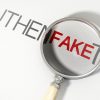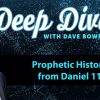When did the Minor Prophets proclaim God’s messages? We’re they all priests? How did they present their prophecies to the people?
Nathan Jones, my ministry colleague who serves as Associate Evangelist and Web Minister here at Lamb & Lion Ministries, has published a book titled 12 Faith Journeys of the Minor Prophets. It has already gone into additional printings and is being used by numerous Bible study groups. It is, without a doubt, the finest book I have ever read about the Minor Prophets. It is down-to earth, easy-to-understand, and it makes the messages of these prophets relevant to our lives here and now.
On a recent episode of Christ in Prophecy, I interviewed Nathan about why he felt led to write a book on such an obscure section of the Bible. I think by his answers you’ll be surprised just how relevant the Minor Prophets are to your faith today.
Times and Backgrounds
Dr. Reagan: These prophets were active about 800-400 years before Christ was born then?
Nathan Jones: Right, the times of the Minor Prophets would fall into the time period when Israel and Judah had split. These nations are on the decline. Assyria, Babylon, and then the Medo-Persian Empires are beginning to conquer and exile Israel and then later Judah. The later Minor Prophets deal with the Jewish people’s return from exile.
Dr. Reagan: Groups of Minor Prophets fall into some categories because some of these men are on the scene before the exile to Babylon and some after.
Nathan Jones: Right. For the post-exilic prophets, you find Haggai and Zechariah are busy in the Temple’s rebuilding project. Malachi is the last of the 12 dated at 400 BC.
Dr. Reagan: What about their backgrounds? Were all of these prophets say priests?
Nathan Jones: A lot of people just assume they were priests. Malachi was a priest. But, no. The neat thing about the Minor Prophets is that they are everyday men. The term nabi, which is Hebrew for prophet, means “a messenger from God.” It doesn’t mean necessarily that they predicted the future, it just means that God had a message for them to deliver. A lot of times prophecy was built into that message.
There was construction workers, there were fig pickers, there were musicians. Some of these men were young, some of them like Haggai were old. They covered a variety of ages. Their background really are a great representation of every person.
Dr. Reagan: When you infer these men were often common people, I always think of Amos who is described as a fig picker from Tekoa.
Nathan Jones: I’ve seen Tekoa on one of Israel tours. Very small town. The only Minor Prophet that was a nobleman was likely Zephaniah.
Prophetic Styles
Dr. Reagan: What are the Minor Prophets’ styles? Did they all just write prose or narration or prophecy or what?
Nathan Jones: People love First and Second Kings and First and Second Chronicles because these books are filled with stories. There are stories in the Minor Prophets, but not all of them were story-tellers.
Three types of prophets are found in the Bible. There are the prophets who are the verbal prophets, such as Elijah, who didn’t write down anything, or Nathan when he talked to King David. They didn’t write any of their messages down, but we know them through other biblical authors’ writings.
Second, there are the acting prophets. The acting prophets are great because God would say, “Do something” and they would do it. For example, Micah was ordered to run around almost naked, and Hosea had to name two of his children really funny names. They had to do these things to give the prophecy some extra impact. The people took notice when the prophets acted out their prophecies.
Third were the writing prophets. Thank the Lord for the writing prophets, because if we didn’t have them we wouldn’t have the Minor Prophets or any of the other prophetic writings in the Bible.
Dr. Reagan: Even with the writing prophets there was diversity of style. Some of them would write prose, some of them wrote poetry, and some of them wrote autobiographies, like Jonah.
Nathan Jones: Second Peter 1:21 says, “For prophecy never came by the will of man, but holy men of God spoke as they were moved by the Holy Spirit.” So, another reason to read the Minor Prophets is the Holy Spirit was speaking through these men. But, like all 43 authors in the Bible, they spoke based on their own personalities. So, for instance, Micah was a real fire brand. He wrote with such a fiery passion. Others who were more reserved, like Zephaniah. Their writings reflect some of their own personalities. By reading their texts you can kind of pick up on their personalities.
For #prophecy never came by the will of man, but holy men of #God spoke as they were moved by the #HolySpirit. - 2 Peter 1:21 Click To TweetIn the third segment of our look at why the Minor Prophets are relevant to us today, Nathan will identify which of the 12 he thought was the strangest prophet.
Resource
Dr. David Reagan considers the book 12 Faith Journeys of the Minor Prophets by Nathan Jones and his co-author, Pastor Steve Howell, to be the best book about the Minor Prophets that he has ever read.
The book runs a total of 313 pages. It sells for $20, including the cost of shipping. You can order online through our website!









Thank you for sharing!
Our life group are beginning a study in the minor prophets beginning with Hosea. I will be looking to pick up on some of your information. God Loves Israel and all of mankind.